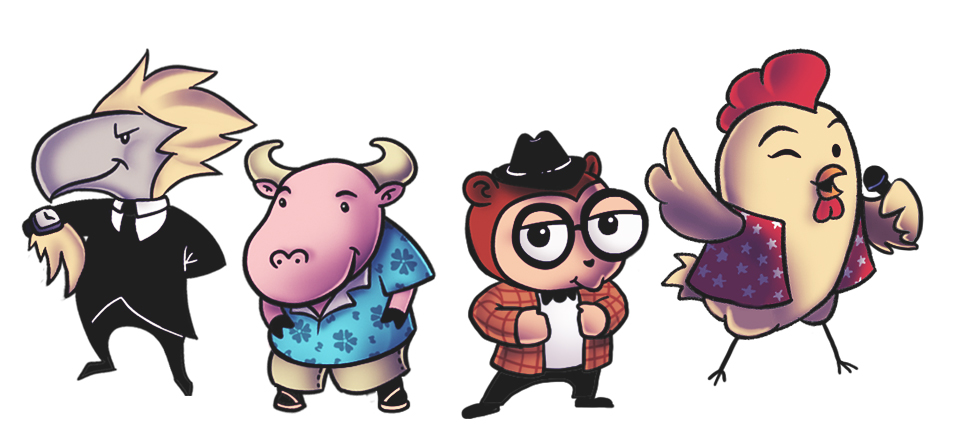Photo by http://nuviawater.com/
My wife, Kat, and I had our first child after four years of waiting. We planned to have our next baby after four years, but lo and behold, Kat was pregnant again after a year. Well, that’s life. We love our children dearly and consider them our greatest treasures.
Our two daughters, Gabbie, 9, and Alexa, 7, are very different from each other. They are the very best of friends, but not a single day passes that they don’t fight. In today’s lingo, they are the best example of “frenemies”.
How can you best parent children who are very different from each other?
My first book, entitled YOUnique: Understanding Others by Understanding YOU, is about the four personality types, based on the DISC model of behavior from William Marston’s work in the 1920s. It was derived from Hippocrates’ study over 2,000 years ago on the differences of people. When I learned this concept, it changed the way I saw people, including my children.
For YOUnique, I used the DISC vernacular and added animals to represent each one:

Dominant Eagles are action-oriented people who make things happen. Gabbie, a Dominant, is very aggressive and competitive. She always gets all the KC Bucks—their version of money in Kids Church. Her teachers tend to look for other kids to raise their hands because Gabbie was always first to raise hers. Here’s a typical conversation between us:
Gabbie: Dad, you know what I want to be when I grow up?
Me: What?
Gabbie: I’m choosing between a ballerina, a baker, or maybe a scientist.
Me: How about an author and speaker like Dad?
Gabbie: Yes Pops, that too.
Dominants can be overly aggressive and domineering at times. These are the intimidating teachers or bosses. Their favorite P word is powerful and their favorite song is “My Way” (if you know what I mean).
The Influential Rooster. Just like the noisy rooster, Influentials love to talk and be the center of attention. My second daughter, Alexa, is an Influential. For Alexa, there are no strangers, only friends she hasn’t met yet. She can strike a conversation with just about anyone, young or old. I cannot count the times we were in a restaurant and Alexa would bring a new friend she just met to our table.
Alexa: Daddy, I like you to meet my friend.
Me: Wow, what is your friend’s name?
Alexa: I don’t know, but she is my friend.
However, Influentials tend to drift and lack focus. They are forgetful and are not too keen on details, like the dad who looks for his car in Basement 1 when he actually parked in Basement 3. Or kids who would go to class without a pen, and take five pens home without knowing where they got them. Their favorite P word is popular and their favorite song is “Don’t Worry, Be Happy.”
Carabaos are known for their dependability and consistency in the field. Likewise, Steady Carabaos are dependable and reliable, as long as the work given them is routine work. Loyal and good listeners, they may only have a few close friends, but theirs is a tight-knit group. Most counselors are Steady Carabaos. On the flip side, Steadies find it difficult to make decisions and avoid confrontation at any cost.
A High Steady, Kat takes a long time to choose a restaurant, and even more to order food. She simply takes her time. This may be a blessing in disguise because I am a Dominant, so she balances my ready-fire-aim nature. The best quality of a Steady is their demeanor and outlook in life: they are not easily rattled or shaken. Peaceful is their favorite P word, and their favorite song is “We are the World.”
Lastly, we have the Corrective Tarsier. Tarsiers are nocturnal creatures. They can actually turn their heads 180 degrees to the left or right. (Take note: 180 degrees, not 360, or that might be a possessed tarsier.) Correctives love and live to analyze. They are good with statistics, charts, and the like. Tashi, a friend of my kids, is a High Corrective. He loves facts, and when he falls in love with a topic, he puts his mind and heart into it. Their favorite P word is perfect and their favorite song – “You are… Perfect.”
A Tarsier’s strength can also be its weakness, though. When they analyze too much, the result is analysis paralysis.
So there you have it — the four YOUnique personality types.
When conducting parenting talks, I ask parents, “Who among you loves your children equally?” All of them raise their hands. My second question is “Who among you treats your children equally?” Again, everybody raises their hands. I tell them that their first answer is correct: you should love your children equally. But the second one is wrong; you should treat your children differently– because they are different from each other.
We all believe in the Golden Rule, “Do unto others what you want others to do unto you.” However, when it comes to people and your children, we need a more definitive rule: “Do unto others as they would have it done unto them.” In other words, the YOUnique Rule is: Treat others the way they want to be treated. That is the best way to inspire our children to be the best version of themselves. Know their personality, love them unconditionally, and treat them the way they want and need to be treated.


Jayson Lo is a speaker and the author of YOUnique: Understanding Others by Understanding YOU. His main goal is to inspire people to be the best that they can be by bringing out their YOUniqueness.
Related Posts
-
What Can Parents Do When A Child Shows Signs of Depression?
What can parents do when a child shows signs of depression? Are there ways to…
-
Getting Your Child to Read
Reading isn't only an important milestone for your child, it's also an experience you can…
-
Parenting a Child with Asperger’s: Joys and Challenges
Read the journey that the parent of a child with Asperger's goes through.




